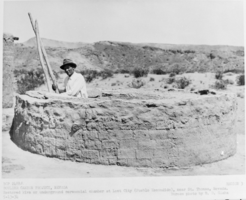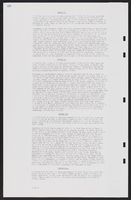Search the Special Collections and Archives Portal
Search Results
Painting of the Lost City, Nevada: photographic print, approximately 1935 to 1959
Level of Description
Item
Archival Collection
UNLV Libraries Single Item Accession Photograph Collection
To request this item in person:
Collection Number: PH-00171
Collection Name: UNLV Libraries Single Item Accession Photograph Collection
Box/Folder: Folder 16
Collection Name: UNLV Libraries Single Item Accession Photograph Collection
Box/Folder: Folder 16
Archival Component
View of Lost City, Nevada: photographic print, approximately 1930 to 1959
Level of Description
Item
Archival Collection
UNLV Libraries Single Item Accession Photograph Collection
To request this item in person:
Collection Number: PH-00171
Collection Name: UNLV Libraries Single Item Accession Photograph Collection
Box/Folder: Folder 16
Collection Name: UNLV Libraries Single Item Accession Photograph Collection
Box/Folder: Folder 16
Archival Component
Lost in the Horse Latitudes by H. Allen Smith, 1945 March
Level of Description
File
Archival Collection
Beverly Rogers Collection of Armed Services Editions
To request this item in person:
Collection Number: MS-00913
Collection Name: Beverly Rogers Collection of Armed Services Editions
Box/Folder: Case ase_bookcase
Collection Name: Beverly Rogers Collection of Armed Services Editions
Box/Folder: Case ase_bookcase
Archival Component

Film transparency of kiva at the Lost City near St. Thomas, Nevada, May 13, 1934
Date
1934-05-13
Archival Collection
Description
Black and white image with the following printed description: Restored kiva or underground ceremonial chamber at Lost City (Pueblo Escondido), near St. Thomas, Nevada.
Image
Baggage - lost and found articles, storage, theatrical cars, 1908-1947
Level of Description
File
Archival Collection
Union Pacific Railroad Collection
To request this item in person:
Collection Number: MS-00397
Collection Name: Union Pacific Railroad Collection
Box/Folder: Box 57 (Restrictions apply)
Collection Name: Union Pacific Railroad Collection
Box/Folder: Box 57 (Restrictions apply)
Archival Component
Spanier, David. Fortunes: they are won or lost with equal aplumb, Almanac, 1986
Level of Description
File
Archival Collection
UNLV Libraries Collection of Articles on Gaming and Las Vegas, Nevada Topics
To request this item in person:
Collection Number: MS-00626
Collection Name: UNLV Libraries Collection of Articles on Gaming and Las Vegas, Nevada Topics
Box/Folder: Box 15
Collection Name: UNLV Libraries Collection of Articles on Gaming and Las Vegas, Nevada Topics
Box/Folder: Box 15
Archival Component
Waters of Lake Mead rise to base of Lost City Restorations, 1939
Level of Description
File
Archival Collection
Elbert Edwards Photograph Collection
To request this item in person:
Collection Number: PH-00214
Collection Name: Elbert Edwards Photograph Collection
Box/Folder: Folder 06
Collection Name: Elbert Edwards Photograph Collection
Box/Folder: Folder 06
Archival Component
Waters of Lake Mead rise to base of Lost City Restorations, 1938
Level of Description
File
Archival Collection
Elbert Edwards Photograph Collection
To request this item in person:
Collection Number: PH-00214
Collection Name: Elbert Edwards Photograph Collection
Box/Folder: Folder 06
Collection Name: Elbert Edwards Photograph Collection
Box/Folder: Folder 06
Archival Component
City of Las Vegas, Nevada Municipal Court System Proposal, 1979 April 20
Level of Description
File
Archival Collection
City of Las Vegas, Nevada Records
To request this item in person:
Collection Number: MS-00674
Collection Name: City of Las Vegas, Nevada Records
Box/Folder: Box 03
Collection Name: City of Las Vegas, Nevada Records
Box/Folder: Box 03
Archival Component
Pagination
Refine my results
Content Type
Creator or Contributor
Subject
Archival Collection
Digital Project
Resource Type
Year
Material Type
Place
Language
Records Classification

